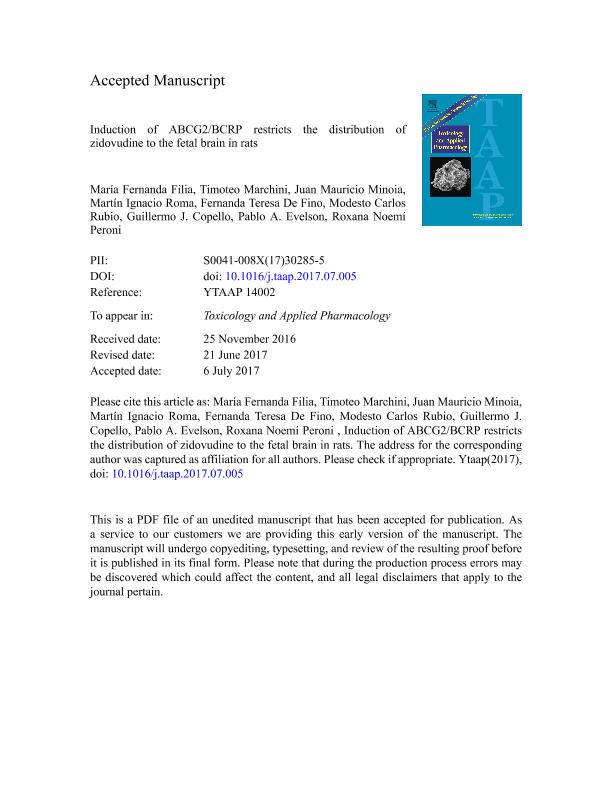Artículo
Induction of ABCG2/BCRP restricts the distribution of zidovudine to the fetal brain in rats
Filia, Maria Fernanda; Marchini, Timoteo Oscar ; Minoia, Juan Mauricio
; Minoia, Juan Mauricio ; Roma, Martin Ignacio; de Fino, Fernanda Teresa
; Roma, Martin Ignacio; de Fino, Fernanda Teresa ; Rubio, Modesto Carlos
; Rubio, Modesto Carlos ; Copello, Guillermo Javier
; Copello, Guillermo Javier ; Evelson, Pablo Andrés
; Evelson, Pablo Andrés ; Peroni, Roxana Noemi
; Peroni, Roxana Noemi
 ; Minoia, Juan Mauricio
; Minoia, Juan Mauricio ; Roma, Martin Ignacio; de Fino, Fernanda Teresa
; Roma, Martin Ignacio; de Fino, Fernanda Teresa ; Rubio, Modesto Carlos
; Rubio, Modesto Carlos ; Copello, Guillermo Javier
; Copello, Guillermo Javier ; Evelson, Pablo Andrés
; Evelson, Pablo Andrés ; Peroni, Roxana Noemi
; Peroni, Roxana Noemi
Fecha de publicación:
09/2017
Editorial:
Academic Press Inc Elsevier Science
Revista:
Toxicology and Applied Pharmacology
ISSN:
0041-008X
Idioma:
Inglés
Tipo de recurso:
Artículo publicado
Clasificación temática:
Resumen
Safety concerns for fetus development of zidovudine (AZT) administration as prophylaxis of vertical transmission of HIV persist. We evaluated the participation of the ATP-binding cassette efflux transporter ABCG2 in the penetration of AZT into the fetal brain and the relevance for drug safety. Oral daily doses of AZT (60 mg/kg body weight) or its vehicle were administered between post gestational days 11 (E11) and 20 (E20) to Sprague-Dawley pregnant rats. At E21, animals received an intravenous bolus of 60 mg AZT/kg body weight in the presence or absence of the ABCG2 inhibitor gefitinib (20 mg/kg body weight, ip) and AZT in maternal plasma and fetal brain were measured by HPLC-UV. ABCG2 protein expression in placenta and fetal brain, as well as mitochondrial function and ultrastructure in fetal brain were also analyzed. In utero chronic exposure to AZT markedly induced ABCG2 expression in placenta and fetal brain whereas did not significantly alter mitochondrial functionality in the fetal brain. The area-under-the-concentration-time-curve of AZT significantly decreased in fetal brains isolated from AZT-exposed fetuses compared to control group, but this effect was abolished by ABCG2 inhibition. Our results suggest that the absence of mitochondrial toxicity in the fetal brain after chronic in utero administration of AZT could be attributed to its low accumulation in the tissue caused, at least in part, by ABCG2 overexpression. We propose that any interference with ABCG2 activity due to genetic, pathological or iatrogenic factors would increase the amount of AZT reaching the fetal brain, which could increase the risk of toxicity of this drug on the tissue.
Palabras clave:
Abcg2
,
Bioavailability
,
Fetal Brain
,
Hiv
,
Placenta
,
Zidovudine
Archivos asociados
Licencia
Identificadores
Colecciones
Articulos(IBIMOL)
Articulos de INSTITUTO DE BIOQUIMICA Y MEDICINA MOLECULAR
Articulos de INSTITUTO DE BIOQUIMICA Y MEDICINA MOLECULAR
Articulos(ININFA)
Articulos de INST.DE INVEST.FARMACOLOGICAS (I)
Articulos de INST.DE INVEST.FARMACOLOGICAS (I)
Articulos(IQUIMEFA)
Articulos de INST.QUIMICA Y METABOLISMO DEL FARMACO (I)
Articulos de INST.QUIMICA Y METABOLISMO DEL FARMACO (I)
Articulos(NANOBIOTEC)
Articulos de INSTITUTO DE NANOBIOTECNOLOGIA
Articulos de INSTITUTO DE NANOBIOTECNOLOGIA
Citación
Filia, Maria Fernanda; Marchini, Timoteo Oscar; Minoia, Juan Mauricio; Roma, Martin Ignacio; de Fino, Fernanda Teresa; et al.; Induction of ABCG2/BCRP restricts the distribution of zidovudine to the fetal brain in rats; Academic Press Inc Elsevier Science; Toxicology and Applied Pharmacology; 330; 9-2017; 74-83
Compartir
Altmétricas



